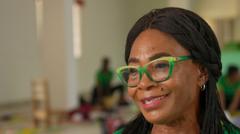In Nigeria, the challenge of neonatal jaundice has escalated into a public health crisis, with serious implications for children born in the country. Joyce Nweke, a determined mother, runs the Cerebral Palsy Centre in Lagos, providing care for children like 22-year-old Babatunde Fashola, known as Baba, who suffers from severe cerebral palsy. The condition affects many Nigerian children, with research indicating that over 700,000 may be living with it due to untreated neonatal jaundice, caused by a build-up of bilirubin in newborns.
Professor Chinyere Ezeaka, a pediatrician, states that more than 60% of newborns experience jaundice, yet many do not receive timely treatment, which is crucial within the first ten days of life to prevent lasting brain damage. The lack of adequate medical facilities exacerbates this issue, as Nigeria is reported to have only three privately-run cerebral palsy centers for a population of over 200 million.
Nweke established her center ten years ago after facing stigma and rejection when seeking care for her daughter, Zimuzo, who was diagnosed with cerebral palsy shortly after adoption. Today, the center provides necessary support for 12 children but faces a growing waiting list, with over 100 applications for care. Each child's treatment cost averages $1,000 per month, a daunting figure given the national minimum wage is about $540 yearly.
In addition to raising awareness and providing care, Nweke's mission includes addressing societal beliefs that perpetuate stigma against children with disabilities. Some families abandon or cast out children believed to be cursed, especially in rural areas. Recently, charities like the Oscar Project have emerged to improve early diagnosis and treatment for neonatal jaundice by providing medical facilities with vital equipment and training healthcare workers.
Launched in 2019 in Vietnam, the Oscar Project has already improved outcomes for 150,000 children and aims to implement similar success in Nigeria. The project's founder, Oscar Anderson, a disability advocate, emphasizes the need for universal screening and faster help, ensuring no child faces the challenges of untreated jaundice.
Despite the enormity of the task ahead, projects and centers like Nweke's continue to foster hope, recognizing that addressing neonatal jaundice today could prevent lifelong challenges tomorrow. The situation calls for urgent attention from government and international agencies to overhaul the country's public health response to childhood illnesses.
Professor Chinyere Ezeaka, a pediatrician, states that more than 60% of newborns experience jaundice, yet many do not receive timely treatment, which is crucial within the first ten days of life to prevent lasting brain damage. The lack of adequate medical facilities exacerbates this issue, as Nigeria is reported to have only three privately-run cerebral palsy centers for a population of over 200 million.
Nweke established her center ten years ago after facing stigma and rejection when seeking care for her daughter, Zimuzo, who was diagnosed with cerebral palsy shortly after adoption. Today, the center provides necessary support for 12 children but faces a growing waiting list, with over 100 applications for care. Each child's treatment cost averages $1,000 per month, a daunting figure given the national minimum wage is about $540 yearly.
In addition to raising awareness and providing care, Nweke's mission includes addressing societal beliefs that perpetuate stigma against children with disabilities. Some families abandon or cast out children believed to be cursed, especially in rural areas. Recently, charities like the Oscar Project have emerged to improve early diagnosis and treatment for neonatal jaundice by providing medical facilities with vital equipment and training healthcare workers.
Launched in 2019 in Vietnam, the Oscar Project has already improved outcomes for 150,000 children and aims to implement similar success in Nigeria. The project's founder, Oscar Anderson, a disability advocate, emphasizes the need for universal screening and faster help, ensuring no child faces the challenges of untreated jaundice.
Despite the enormity of the task ahead, projects and centers like Nweke's continue to foster hope, recognizing that addressing neonatal jaundice today could prevent lifelong challenges tomorrow. The situation calls for urgent attention from government and international agencies to overhaul the country's public health response to childhood illnesses.




















